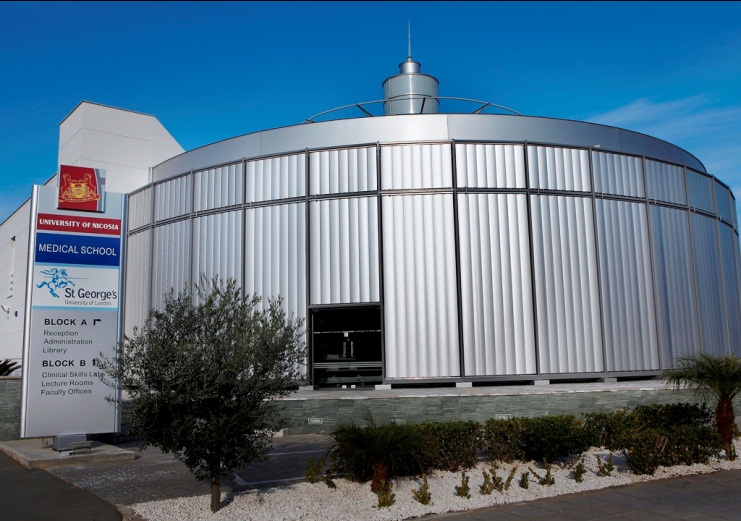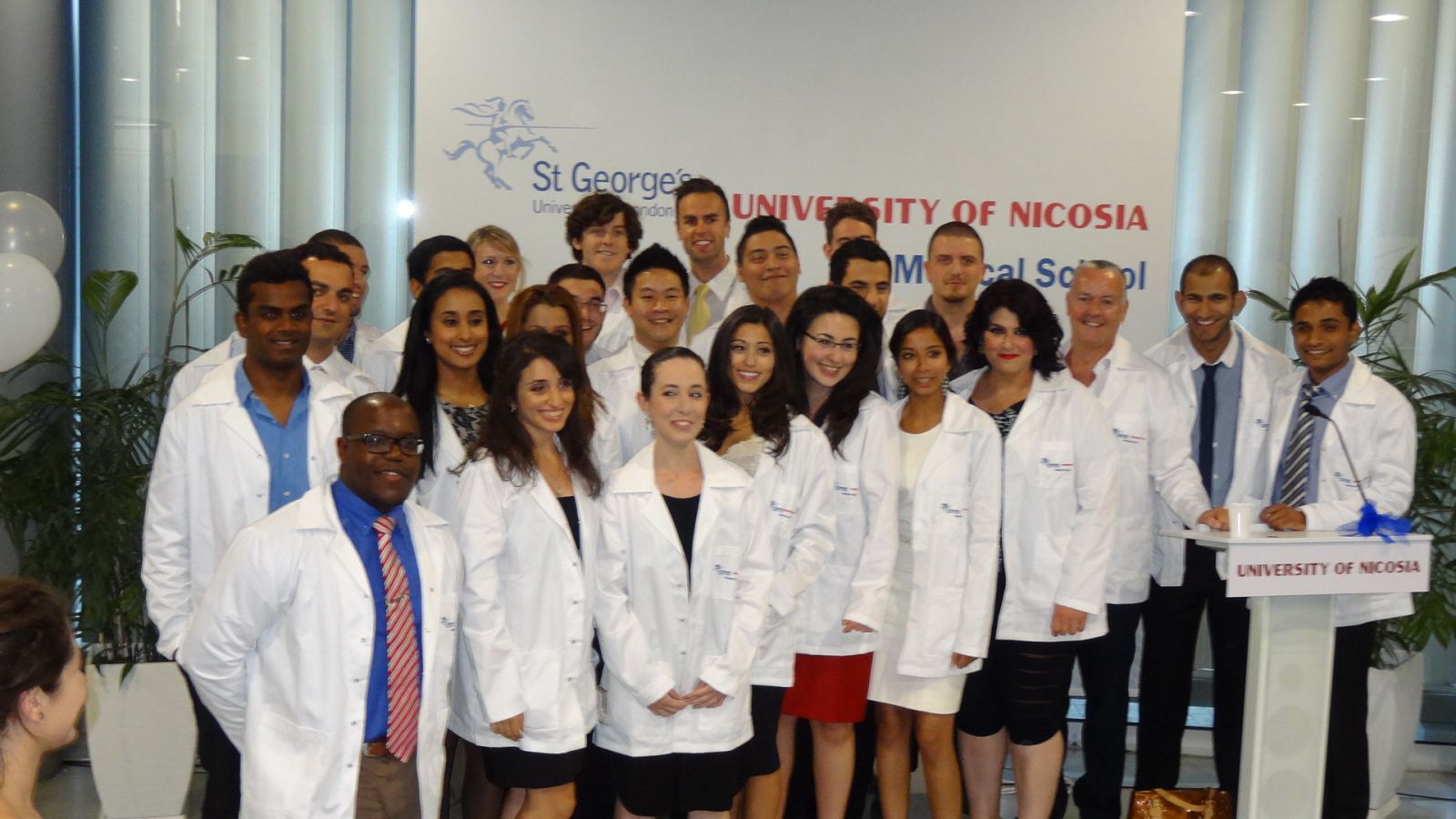


Theme
International Dimensions
INSTITUTION

The Programme: In 2011, the first cohort of students undertaking the franchised MBBS graduate entry programme at St George’s University of London (SGUL) started at the University of Nicosia in Cyprus. According to Cyprus legislation, franchised programmes should deliver identical outcomes to that of the original programme.


PBL is the key learning strategy used in years 1 and 2. The programme uses long cases with tutor notes reaching up to 30 pages per case. The case is progressively released in three tutorials. The PBL cases were designed for a UK-based curriculum so delivery to a much more international cohort was potentially challenging. Further, it was not permitted by Cypriot law to make any significant changes to the PBL cases.
The students: Our students come from 21 different countries around the world making our program quite diverse.
Aim
To determine whether the PBL cases were transferable to an international cohort.
Methodology
Reviewing the cases
1. The year leads in Cyprus and the UK set up Module teams in Cyprus to examine the cases.
2.The Module teams examined all the cases under the guidance of their London colleagues.
3. The Module teams highlighted areas that might need adaptation. Those areas fell under the following categories:
a. nuances of the English language
b. UK-specific cultural issues
c. differences in medical care and support services
4. Supplementary information was put together and provided to students where necessary.
Other factors considered
1. Running cases simultaneously in two countries in different timezones.
2. Finding appropriate tutors.
The evaluation of the cases indicated that 19 out of the 35 cases needed some additional information in order to adapt the case to an international cohort (fig. 1A).
The evaluation of the cases highlighted differences relating to (a) nuances of the English language (b) UK-specific cultural issues, and importantly (c) differences in medical care and support services (fig. 1B).
.jpg)
As indicated by figure 1B the majority of the differences related to differences in medical care and support services.
Looking at the differences in medical care and support services in Cyprus and the UK it was noted that those fall under three major categories (a) GP and specialists, (b) other services available and (c) prevalence of illness (Fig. 2).
.jpg)
A selection of those is shown in table 1 below.
Table 1: Differences in medical care and support services identified through PBL cases.
|
GP and Specialists |
|
|
UK |
CY |
|
Examination of the ear is initially performed by GPs. |
Examination of the ear is performed in private ENT/audiology practices, or hospital audiology departments. |
|
Gynaecological problems are initially dealt with by the GP. |
Patients go directly to Obstetrician/
Gynaecologist. |
|
Babies and children seen by GPs. |
Babies and children seen by paediatricians. |
|
Patients with musculoskeletal pain visit/obtain primary care from GPs. |
Patients with musculoskeletal pain visit/obtain primary care from orthopaedic surgeons or rheumatologists. |
|
Other Services Availability |
|
|
UK |
CY |
|
Sickle Cell Clinic |
Thalassaemia Center |
|
Community midwife |
Not available. Care provided by obstetrician. |
|
Nurse Practitioners - undertake provision of services (Check-ups, prescription writing). |
There are no nurse practitioners. |
|
Well woman check |
No such service exists |
|
NHS Direct |
No telephone based medical advice system exists. |
|
Shared Care |
Shared Care does not exist |
|
Community mental health team. |
This does not exist. |
Prevalence of Illness
· In general prevalence statistics are different in the UK and Cyprus and whenever applicable this is pointed out to the students.
· Lack of prevalence data on Hepatitis, TB or HLA associations.
Other factors considered
Running cases simultaneously in two countries in different timezones
Cyprus has a two hour difference from the UK so that meant that:
1. PBL started in Cyprus at 09:00 (CY time) and then two hours later 11:00 (CY time, 09:00 UK time) the UK cohort started the case.
2. Each PBL tutorial runs for three hours so the Cyprus cohort was still in PBL when their UK counterparts started the case.
3. PBLs in Year 2 run on different days in the UK and in Cyprus.
4. In most years there are differences in holidays e.g. Easter, Cataclysmos Day. The PBLs therefore have to run on different days or even different weeks.
5. There has been some leakage of PBLs across countries.
Finding appropriate tutors
All key persons in the course were trained for PBL. That included physicians, basic scientists, social scientists and clinical psychologists. All tutors have been regularly monitored, peer reviewed and given formal written and verbal feedback by experienced PBL tutors.
Assessment of the two cohorts
An indicator of whether curriculum delivery was successful is student assessment. Both cohorts took the same exams at the same time and the results indicated that there were only small differences in the performance of the UK cohort as compared to the Cyprus cohort. Detailed results categorized by theme are shown in Tables 2 and 3.
Table 2: Yearly average assessment results for the UK and CY cohorts for the academic year 2011-12 (Abbreviations: Basic Clinical Sciences (BCS), Personal and Professional Development (PPD), Community and Population Health (CPH), Patient and Doctor (PD)).
|
Student Numbers |
|
BCS % |
PPD/CPH % |
PD % |
Total Weighted mark |
|||||
|
UK |
CY |
|
UK |
CY |
UK |
CY |
UK |
CY |
UK |
CY |
|
128 |
30 |
Average |
68.8 |
64.3 |
71.3 |
64.9 |
78.0 |
77.3 |
71.7 |
67.7 |
|
|
|
SD |
8.0 |
8.4 |
9.0 |
7.4 |
5.2 |
6.4 |
6.7 |
6.9 |
Table 3: Yearly average assessment results for the UK and CY cohorts for the academic year 2012-13
|
Student Numbers |
|
BCS % |
PPD/CPH % |
PD % |
Total Weighted mark |
|||||
|
UK |
CY |
|
UK |
CY |
UK |
CY |
UK |
CY |
UK |
CY |
|
124 |
68 |
Average
|
69.0 |
69.0 |
68.0 |
65.0 |
72.4 |
72.9 |
69.0 |
69.0 |
|
|
|
SD
|
9.0 |
7.1 |
10.0 |
7.8 |
6.4 |
6.2 |
7.0 |
6.0 |
· Evaluations pointed to several differences that were not prohibitive in delivering the curriculum. Indeed while the Cyprus cohort of students performed slightly lower than their UK counterparts in 2011/12 the 2012/13 cohort has performed at least as well as their UK counterparts.
· The additional information provided supported student learning and broadened their understanding of global healthcare issues.
· A PBL curriculum created for students from the UK can run just as effectively in Cyprus with a group of international students.
.jpg)
http://ieposter.com/eposter_manager/upload/registration/189/files/Class of 2016(2).jpg
PBL cases are transferable between Cyprus and the UK, provided there is cooperation and support.
We would like to thank the teams in London and Cyprus for contributing to the careful reading and supplementing the cases.

 Send Email
Send Email